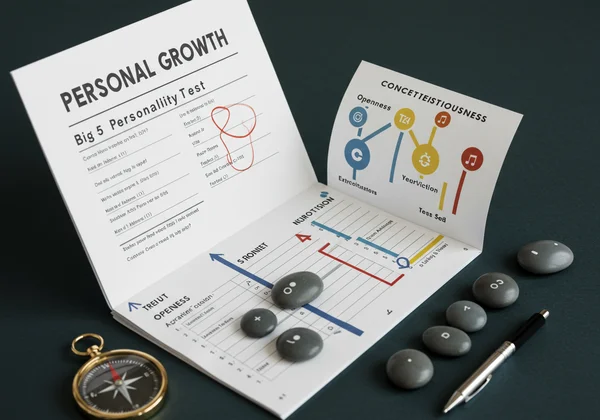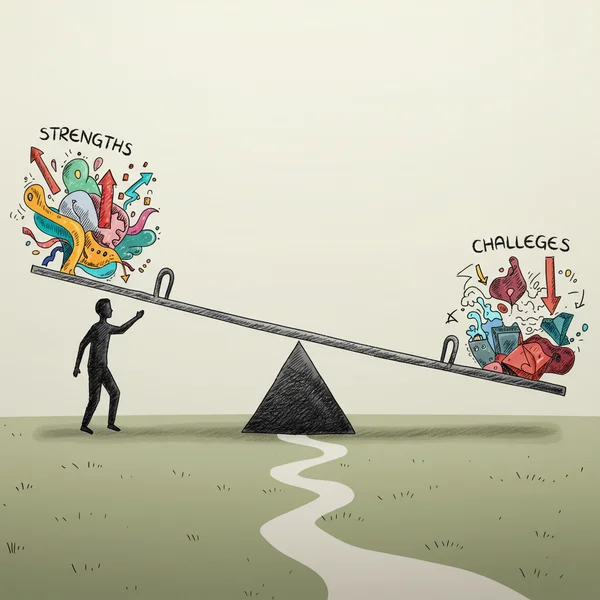Big 5 Personality Test: Actionable Strategies for Personal Growth
You've taken the Big 5 Personality Test, received your scores for Openness, Conscientiousness, Extraversion, Agreeableness, and Neuroticism, and now you're wondering: what’s next? Knowing your traits is the first step, but true value comes from applying that knowledge. How can I use my Big 5 results for personal development? This guide will help you move beyond understanding to practical, actionable strategies for leveraging your unique Big 5 profile. True Big 5 Personal Growth begins when you turn insight into action.

The journey of self-discovery doesn't end with a set of scores. In fact, that's where it truly begins. Your personality profile is a roadmap, not a destination. If you haven't yet discovered your unique profile, you can take the free Big 5 Personality Test on our platform to get started. This guide will help you interpret that map and navigate your path toward unlocking your full potential in every area of your life.
Leveraging Your Big 5 Traits for Self-Improvement
The foundation of using the results from your Big 5 Personality Test for growth is to abandon the idea of "good" or "bad" traits. Each dimension represents a continuum, and both high and low scores come with a unique set of advantages and challenges. The goal isn't to fundamentally change who you are, but to work with your natural tendencies to build a more effective and fulfilling life. These self-improvement strategies are about harnessing your innate personality.
Understanding Your Unique Big 5 Profile for Growth
Your personality isn't just one score; it's the dynamic interplay of all five. A person high in Extraversion and high in Conscientiousness will approach networking very differently than someone high in Extraversion but low in Conscientiousness. The first might be a structured, goal-oriented networker, while the second might be more spontaneous and social. Your unique profile provides the context for growth. Before creating a plan, reflect on how your traits interact. What patterns do you notice? Where do your traits reinforce each other, and where do they create tension? This holistic view is crucial for effective personal development.
Turning Strengths into Superpowers: Maximizing Your High Scores
Your high scores indicate your natural strengths—the areas where you operate with the least friction. The key to maximizing strengths is to intentionally place yourself in situations where these traits can shine. If you score high in Agreeableness, you are likely a natural collaborator and mediator. You can turn this strength into a superpower by actively seeking roles in team projects, volunteering to resolve conflicts, or mentoring junior colleagues. By consciously applying your dominant traits, you build confidence and achieve success more organically.
Addressing Challenges: Navigating Areas for Big 5 Personal Growth
Your lower scores are not weaknesses; they are simply areas for growth. They highlight situations that might drain your energy or require more conscious effort. If you score low on Conscientiousness, for instance, you might struggle with disorganization or procrastination. Instead of forcing yourself to become a meticulous planner overnight, you can build systems that support you, like using reminder apps or breaking large projects into tiny, manageable steps. The goal is not to reverse your score but to develop coping mechanisms and strategies that mitigate the potential downsides. This is where you can truly apply your Big 5 results.

Actionable Insights: Tailored Strategies for Each Big 5 Dimension
Now, let's dive into specific, actionable insights for each of the five core personality traits. Whether your score is high or low, there are concrete steps you can take to foster growth.

Openness: Fostering Creativity & Intellectual Curiosity
Openness to Experience reflects your curiosity, creativity, and appreciation for new things.
- If you scored high: Lean into your creativity. Schedule time for brainstorming, start a creative hobby like painting or writing, or plan a trip to a place you’ve never been. Your challenge is to channel your flood of ideas into tangible projects.
- If you scored low: Gently push your boundaries. Try a new type of cuisine this week, listen to a genre of music you normally wouldn't, or read a book on a topic completely foreign to you. The goal is to introduce novelty in small, manageable doses to build your comfort with the unfamiliar.
Conscientiousness: Boosting Productivity & Goal Achievement
Conscientiousness is about your level of organization, discipline, and goal-directed behavior.
- If you scored high: Your strength is reliability. However, you may be prone to perfectionism or burnout. Practice delegating tasks and learn to recognize when "good enough" is truly enough. Schedule intentional downtime to avoid exhaustion.
- If you scored low: Structure is your friend. Break down your goals into the smallest possible steps. Use tools like calendars, to-do lists, and phone reminders to create an external system for organization. Celebrate small wins to build momentum and prove to yourself that you can follow through. You can discover your Big 5 traits and start building these systems today.
Extraversion: Enhancing Social Connections & Energy Management
Extraversion relates to where you draw your energy from—social interaction or solitude.
- If you scored high: You thrive in social settings. Seek opportunities for collaboration, networking, and public speaking. Your growth area is energy management; be mindful not to overschedule yourself and learn to appreciate quiet moments to process your thoughts.
- If you scored low: Large group settings can be draining. Focus on quality over quantity in your social life. Schedule one-on-one conversations with colleagues or friends. To prepare for necessary group interactions, plan a few talking points in advance to reduce anxiety.
Agreeableness: Cultivating Stronger Relationships & Empathy
Agreeableness reflects your tendency to be cooperative, compassionate, and considerate of others.
- If you scored high: You excel at building harmonious relationships. Use this skill to mediate disputes and foster teamwork. Your challenge is setting boundaries. Practice saying "no" to requests that overextend you and remember that your needs are also valid.
- If you scored low: You are likely direct and unsentimental, which can be valuable for making tough decisions. To grow, practice active listening. Before stating your opinion, try to summarize the other person's perspective to ensure you understand it. This can build bridges without compromising your authenticity.
Neuroticism: Building Emotional Resilience & Managing Stress
Neuroticism measures emotional sensitivity and the tendency to experience negative emotions like anxiety and stress.
- If you scored high: You are highly attuned to potential threats and your own emotional landscape. This can make you a thoughtful and cautious planner. Your growth lies in emotional resilience. Develop practices like mindfulness, journaling, or regular exercise to manage stress. Identify your triggers and create proactive strategies to cope with them.
- If you scored low: You are likely calm and emotionally stable, which is a great asset under pressure. Your area for development is ensuring you don't become complacent or dismiss the valid concerns of others. Practice checking in with yourself and others emotionally to stay connected and aware. A scientific Big 5 personality test can provide a baseline for this journey.
Integrating Big 5 Insights into Your Daily Life
Understanding your traits and knowing some tailored strategies is great, but the final step is integrating this knowledge into your daily routines. Lasting change comes from small, consistent actions.
Setting SMART Goals Based on Your Personality Traits
Use your Big 5 profile to set more effective goals. The SMART (Specific, Measurable, Achievable, Relevant, Time-bound) framework is even more powerful when personalized. For example, if you are low in Conscientiousness, your "Achievable" step needs to be much smaller. If you are high in Neuroticism, your "Relevant" goal should include steps for managing potential anxiety along the way.
Tracking Progress & Adapting Your Personal Growth Journey
Personal growth is not linear. Use a journal to track your efforts and celebrate your progress, no matter how small. Pay attention to what works and what doesn't. Be prepared to adapt your strategies as you learn more about yourself. Your personality is relatively stable, but your behaviors and habits are malleable. This is the essence of your ongoing self-improvement journey.
![]()
Your Continuous Path to Empowered Personal Growth
Embrace your Big 5 personality insights as a dynamic roadmap for a more intentional and fulfilling life. It's not about changing who you are, but about mastering your authentic self to navigate challenges and maximize your unique strengths. This is your journey to becoming more effectively and authentically you.
Ready to translate your insights into a concrete plan? Our platform offers an optional, AI-driven enhanced report that provides even deeper analysis and a personalized action plan for your growth. Begin your journey today by taking the free Big 5 Personality Test.
Frequently Asked Questions About Big 5 Personal Growth
How can I effectively use my Big 5 results for personal development?
Start by viewing your results without judgment. Identify your highest and lowest scores. Focus on leveraging your high-scoring traits as natural strengths in your career and relationships, while developing practical strategies and systems to support your low-scoring areas.
Can my Big 5 personality traits actually change over time?
While core personality traits are considered quite stable throughout adulthood, research shows they are not set in stone. Significant life events, consistent effort, and therapy can lead to gradual shifts over time. The goal is progress, not a complete personality overhaul.
What if my Big 5 results reveal a trait I don't like?
It's common to have a negative reaction to a certain trait, especially a high Neuroticism or low Conscientiousness score. Reframe this "disliked" trait as an area for awareness. Every trait has strengths; high Neuroticism can mean better preparation and empathy, while low Conscientiousness can foster flexibility and spontaneity. Focus on managing the challenges rather than disliking the trait itself.
How often should I retake the Big 5 test to track growth?
Retaking the Big 5 Personality Test annually or after a major life change (like a new job, relationship, or moving to a new city) can be a valuable way to check in and see how your self-perception and behaviors may have evolved. It helps keep your personal growth journey intentional and informed. For detailed tracking, consider the insights available in a personalized AI-driven enhanced report.